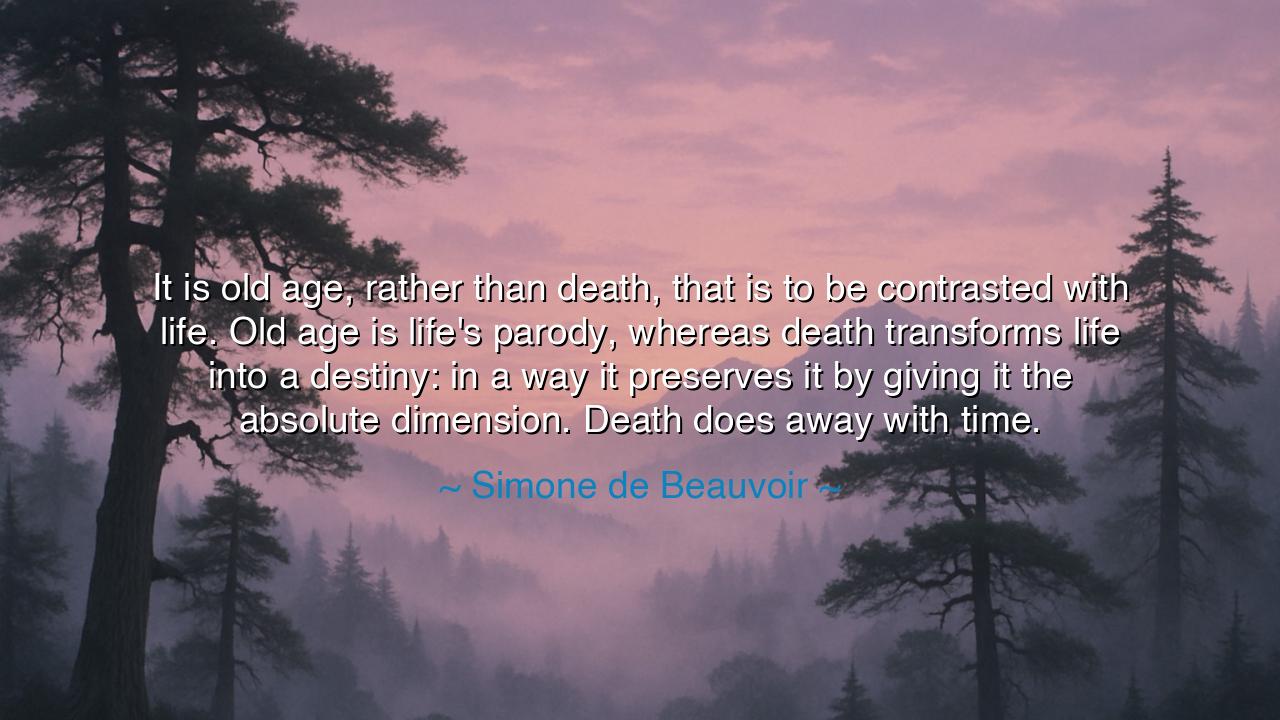
It is old age, rather than death, that is to be contrasted with
It is old age, rather than death, that is to be contrasted with life. Old age is life's parody, whereas death transforms life into a destiny: in a way it preserves it by giving it the absolute dimension. Death does away with time.






In the shadow of life’s fleeting journey, there stands a truth that many fear to confront—the inexorable passage of time. Simone de Beauvoir, in her boundless wisdom, once spoke of the relationship between old age, death, and life, saying, “It is old age, rather than death, that is to be contrasted with life. Old age is life’s parody, whereas death transforms life into a destiny: in a way it preserves it by giving it the absolute dimension. Death does away with time.” In these words lies a profound and often unsettling truth: that while death marks the end of our days, it is old age that truly forces us to face the limitations and fragility of human existence.
What, then, does it mean that old age is a parody of life? In the early days of youth, we are full of promise and vitality, our bodies and minds ready to engage with the world in endless possibility. But as the years pass, old age comes upon us as a shadow, a parody of the energetic spirit of youth. The body weakens, the senses dull, and the strength that once propelled us forward begins to falter. In these later years, life seems to repeat itself not in the vigor of youth but in the slow decay of time. The parody of old age lies in its contrast to the vigor and spontaneity of the earlier stages of life, forcing us to come face-to-face with our impermanence.
But de Beauvoir also suggests something more profound: that death—though feared and misunderstood by many—is, in a way, the preserver of life. By bringing an end to the fleeting nature of time, death offers life an absolute dimension, one that transcends the limitations of the physical world. Death, in its finality, renders time irrelevant. The constant rush of seconds, minutes, and years fades, and what is left is the legacy of one’s actions, the lasting impact of one’s choices. In this sense, death does not end life; it solidifies it, giving it a lasting purpose and meaning that transcends the mundane passage of time.
Let us turn to the ancient philosophers, who understood the relationship between life and death as a cosmic dance. The great Socrates, when faced with the inevitable approach of his own death, did not flee in fear or despair but embraced it with a calm acceptance. “The unexamined life is not worth living,” he famously declared, showing that death, in its certainty, gives life its true meaning. In the face of death, Socrates realized that his actions—his search for truth, his challenge to the minds of his fellow citizens—would be what remained of him. In this way, death became not the end but the completion of his legacy, the ultimate preservation of his soul’s work.
Similarly, the tragic story of Alexander the Great offers a poignant illustration of de Beauvoir’s insight. Though he conquered vast lands and achieved incredible victories, it was his untimely death at the age of 32 that preserved his legacy for millennia. His achievements were immortalized not in the years he lived, but in the destiny he carved out in the brief time he was alive. Death, for Alexander, did not erase his existence but gave it a permanence that would transcend generations. It is in death that we often find the true meaning of a life, for it forces us to reflect on what has been achieved, what has been left behind, and what endures beyond the span of time.
Old age, then, represents the slow loss of that which we hold dear in youth—the vitality, the sense of endless possibility, and the body that carries us through life. Yet it also teaches us to confront our limitations with dignity, to accept the impermanence of our existence, and to find deeper meaning in our relationships and wisdom. As we age, we may come to realize that what truly matters is not the vigor of our youth but the depth of our insight, the richness of our experience, and the lives we touch along the way.
The lesson that de Beauvoir imparts is a sobering but ultimately liberating one: while old age may bring with it a parody of the youthful dreams we once held, it is death that gives our lives a purpose, an absolute dimension. The wisdom we gain in our later years is not just the result of time passed, but the recognition that our true legacy is not in the number of years we live, but in the quality and impact of the time we spend. In embracing death, we are asked to live fully, to find meaning in every moment, for it is in knowing that time is finite that we come to appreciate the preciousness of each passing day.
Therefore, let us live with the awareness that death is not to be feared, but to be understood as the final step that grants life its true significance. Let us age with grace, recognizing the beauty in the wisdom of our years, and let us embrace the inevitable with courage, knowing that it is in death that life finds its eternal meaning. In this way, we transform the parody of old age into the destiny of a life well-lived.






AAdministratorAdministrator
Welcome, honored guests. Please leave a comment, we will respond soon